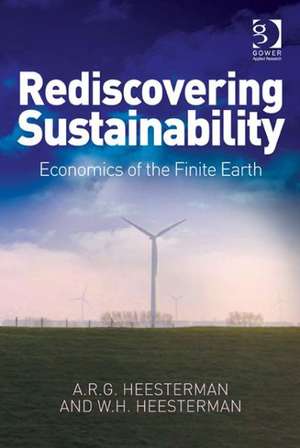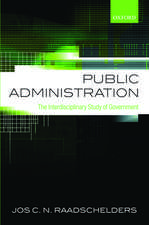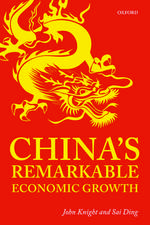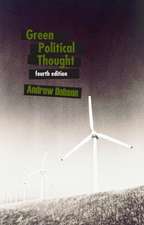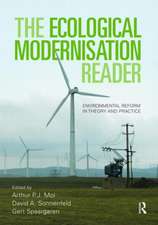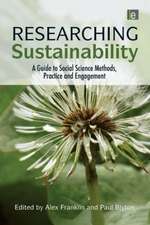Rediscovering Sustainability: Economics of the Finite Earth
Autor A. R. G. Heestermanen Limba Engleză Hardback – 16 ian 2013
| Toate formatele și edițiile | Preț | Express |
|---|---|---|
| Paperback (1) | 244.53 lei 6-8 săpt. | |
| Taylor & Francis – 14 oct 2024 | 244.53 lei 6-8 săpt. | |
| Hardback (1) | 819.90 lei 6-8 săpt. | |
| Taylor & Francis – 16 ian 2013 | 819.90 lei 6-8 săpt. |
Preț: 819.90 lei
Preț vechi: 1102.76 lei
-26% Nou
Puncte Express: 1230
Preț estimativ în valută:
156.90€ • 162.88$ • 130.83£
156.90€ • 162.88$ • 130.83£
Carte tipărită la comandă
Livrare economică 22 martie-05 aprilie
Preluare comenzi: 021 569.72.76
Specificații
ISBN-13: 9781409444565
ISBN-10: 1409444562
Pagini: 344
Dimensiuni: 174 x 246 mm
Greutate: 0.45 kg
Ediția:New.
Editura: Taylor & Francis
Colecția Routledge
Locul publicării:Oxford, United Kingdom
ISBN-10: 1409444562
Pagini: 344
Dimensiuni: 174 x 246 mm
Greutate: 0.45 kg
Ediția:New.
Editura: Taylor & Francis
Colecția Routledge
Locul publicării:Oxford, United Kingdom
Public țintă
AcademicNotă biografică
A.R.G. Heesterman was a senior lecturer at the University of Birmingham, UK, where he supervised Ph.D. theses and managed the degree programme in economic planning. He has a degree in political and social sciences from the University of Amsterdam and has also taught and published in the areas of econometrics and mathematics. Before moving to Birmingham, Aart Heesterman was a research officer at the Central Planning Bureau of the Netherlands' Ministry of Economic Affairs. He has authored five books and numerous articles. W.H. Heesterman has degrees in information science and information technology and a PhD in Law from the University of Warwick in the UK, gained researching children's rights. Wiebina Heesterman has assisted in the creation of human rights databases in Tanzania and Zimbabwe. Fully Conversant with the latest climate and environmental research, the authors have travelled extensively in developing countries witnessing how poverty is aggravated by erratic weather patterns.
Cuprins
Introduction; I: Stylized Market Equilibrium; 1: Restricting Demand for Scarce Resources; 2: Competition and Efficiency; 3: (Un)sustainable Income and Expenditure; II: The Real Market Economy; 4: Scale Economies and Concentration; 5: ‘Equilibrium' Under a False Price Structure; 6: Savings and the Rate of Interest; 7: Demand Management; 8: Part-Globalization; III: Present Affluence Versus the Future; 9: Regimes to Contain Environmental Degradation; 10: Cost-Benefit Analysis; 11: Growth: Its Purpose, Social Implications and Cost; 12: To Conclude
Recenzii
'Thinking clearly and coherently about how we price fossil fuel may be the most important single thing we can do as a civilization. This book provides a useful primer for understanding the issue!' Bill McKibben, founder of www.350.org and author of Eaarth: Making a Life on a Tough New Planet ’A valuable contribution to climate change and economic policy ideas and debates. Rigorously argued, insightful and provocative.’ John Wiseman, Melbourne Sustainable Society Institute, University of Melbourne, Australia ’This book provides insights and conceptual tools to economists and environmentalists intent on resolving the big picture... Rediscovering Sustainability represents a real contribution to economic theory today in a world where some of the political and psychological inhibitions are alarmingly similar to those prevalent 40 years ago. This makes it a very welcome and useful volume.’ Scientists for Global Responsibility Newsletter, Autumn 2013 ’The strength of this book is not in offering new data on climate changes or environmental impacts of energy consumption. Its main contribution is bridging in an original way the gap between environmental science data and economic strategies and systems for a sustainable world. Rediscovering Sustainability is compulsory reading for those teaching, studying, analysing, or otherwise involved in the nexus between science and policy of the sustainability debate.’ Latin American Journal of Management for Sustainable Development, vol.1 no. 1
Descriere
This thought-provoking book summarises the present sustainability predicament and maps out financial and economic strategies. Rediscovering Sustainability helps bridge the gap in understanding between scientists and the green movement on the one side and many economists on the other. Greens worry about catastrophic climate change and mass extinction whilst economists express reservations about spending money to prevent environmental degradation. The authors argue that the limitations of standard economics cause blind spots in its environmental economics sub-field. Examining the limitations of the neoclassical economics framework, Aart and Wiebina Heesterman explore relationships bearing on issues such as the understated cost of fuel for transport. They reveal how flawed economic theory and political compromise bear unhelpfully on an energy market constrained by emissions targets. It is a book for those teaching, studying, campaigning, or policy-making in relation to environmental and sustainability issues, or with the application of economic theory in any context.
